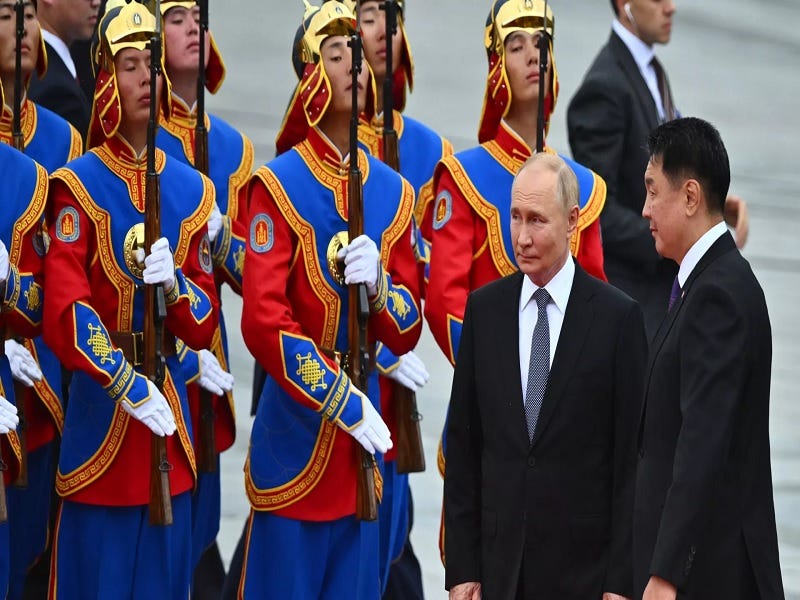Mongolia’s Embrace Of Putin Despite His ICC Warrant Exposes South Africa’s Political Cowardice
South Africa didn’t dare to host Putin in defiance of the West despite being more populous, militarily stronger, and prosperous than Mongolia, not to mention a BRICS member, which should prompt Alt-Media observers reconsider a lot of what they’d hitherto taken for granted.
President Putin was greeted with an honor guard after arriving in Mongolia for his trip this week, where he brought with him an impressive delegation whose diverse expertise confirms his stated intent to continue comprehensively developing their strategic partnership. All of that is standard when it comes to state visits, but what’s so exceptional about this one is that Mongolia is a member of the “International Criminal Court” (ICC) and thus obligated to act on that body’s politicized arrest warrant for Putin.
Its government instead defied Western pressure and proudly prioritized their national interests, which this analysis here argues have to do with recalibrating their geopolitical balancing act in a decisively pro-Russian direction as a result of the accelerated global systemic transition to multipolarity. The example set by this sparsely populated and landlocked state sharply contrasts with South Africa’s after it was too scared to host Putin during last year’s BRICS Summit. Here are some background briefings:
* 14 July 2023: “South Africa’s Deputy President Spilled The Beans About His Country’s BRICS-ICC Dilemma”
* 19 July 2023: “South Africa Showed That BRICS Isn’t What Many Of Its Supporters Assumed”
* 20 July 2023: “South Africa Bungled The Optics Of Its BRICS Compromise With Russia”
South Africa had the opportunity to proudly display its post-Apartheid sovereignty by defying Western pressure to arrest Putin per their country’s obligation to the ICC, but it instead sacrificed these national soft power interests in favor of appeasing the West. This decision was made in spite of South Africa being more populous, militarily stronger, and more prosperous than Mongolia, not to mention a BRICS member, yet it still didn’t dare to host Putin.
What this goes to show is that a country’s metrics – the size of its population, military, and economy as well as its membership in various international organizations – aren’t always the most accurate indicators of sovereignty. A much better model for predicting whether or not a country will comply with or defy external pressure upon it is the composition of its policymaking elite, which is part of its “deep state” (permanent military, intelligence, diplomatic, and other bureaucracies) and also influenced by it.
South Africa’s has pro-Western and multipolar factions just like most Global South countries’ do, and while it’s difficult to discern the exact dynamics of these naturally opaque institutions, the balance of influence is tilted towards the former as proven by what happened last summer. At the same time, however, South Africa is far from a Western puppet since it still won’t sanction Russia despite immense Western pressure. Nevertheless, it was still too afraid to host Putin, which was very disappointing.
Mongolia’s policymaking elite is cut from a completely different cloth since they’ve been multi-aligning like India ever since the end of the Old Cold War through their “Third Neighbor Policy”. This simply preaches the need to cultivate strategic partnerships abroad in order to preemptively avert potentially disproportionate dependence on its Russian and/or Chinese neighbors. The analysis that was hyperlinked in the second paragraph of this piece explains this policy and its evolution more in detail.
It's sufficient for casual observers to know that Mongolia has been practicing a much defter foreign policy than South Africa since 1991, and its elite are therefore more comfortable balancing between competing power centers and taking decisive action in furtherance of national interests when needed. To be sure, they also have a pro-Western faction, but it’s less powerful than in South Africa as proven by Mongolia defying Western pressure to host Putin despite having less impressive metrics as explained.
This insight about the composition of countries’ policymakers and the dynamics between their “deep state” factions can help observers better understand the limitations of BRICS. This analysis here hyperlinks to ten prior ones over the past 18 months that all share “inconvenient” facts about this group, which is revealed to be a network of countries that voluntarily coordinate policy with a view towards accelerating financial multipolarity processes, not an “anti-Western bloc”.
With this in mind, while South Africa’s political cowardice in refusing to host Putin during last year’s summit was very disappointing, it had no impact on their shared network’s operations. Likewise, the same can be said if ICC member Brazil takes a page from Pretoria’s playbook by also refusing to host the Russian leader during next year’s summit. BRICS will continue functioning as it was always intended, which was never the way that many enthusiasts in the Alt-Media Community imagined it.
The takeaway is that countries like South Africa that officially commit to accelerating financial multipolarity processes are sometimes more influenced by Western political pressure than comparatively smaller and weaker countries like Mongolia that haven’t officially committed to that. Once again, everything ultimately comes down to the composition of a country’s policymaking elite and their intra-“deep state” dynamics, not whether or not a country is part of BRICS or whatever other group.





It might have been a good thing, though - by appearing to respect the ICC re: Putin, it was able to lead the case against Israel. I mean, SA couldn't have known that was going to happen, but there is that benefit from it.
One obvious reason can be found by looking at a globe. South Africa has a long coastline and borders with countries that don't always have the most independent governments. Mongolia is landlocked, and completely surrounded by Russia and China.
Just saying it's a lot easier for the US Empire to mess with South Africa than it is for it to mess with Mongolia.